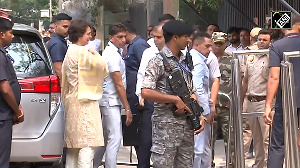On Friday evening, Home Minister L K Advani cancelled an evening show of the Sunny Deol-starrer The Hero at Siri Fort Auditorium. Many speculated that the sudden cancellation was to make way for a pre-CCD (Cabinet Committee on Divestment) meeting.
The next day it became clear that, though the meeting was called at the behest of divestment, IT and Telecom Minister Arun Shourie, it was not privatisation that was on the agenda.
Finance Minister Jaswant Singh had joined Advani and Shourie at 6.30 p.m. to discuss, among other things, the privilege controversy that erupted last week in the case between cellular and basic service providers that is currently being heard by the Telecom Disputes Settlement and Appellate Tribunal.
Earlier in the week, Shourie had met Prime Minister Atal Bihari Vajpayee to brief him on the controversy, in addition to other issues such as the need for more funding for Bharat Sanchar Nigam Ltd and a policy framework ahead of convergence.
The TDSAT order instructing the government to make the files on its limited mobility policy public proved a blow to Shourie's hard-line stance against sharing classified information with the cellular service operators.
The files that the cellular service operators had wanted to be made public explain how the government had, in October 2000, reversed a policy of September 1999 on not allowing basic service providers to offer limited mobility services.
In all, there were seven documents that cellular service operators demanded from Shourie.
Of these, four documents were internal files but not marked secret, one document was a letter from the Telecom Regulatory Authority of India to the department of telecom marked confidential and the other two had notings on the file.
Shourie was ready to hand over some of the documents to TDSAT directly. For others, he had suggested that the secretary files an affidavit swearing to the contents.
But overall, he refused to share the documents with the cellular service operators.
Was he right or wrong?
Well, the Right to Information Act provides the government exemption from revealing the contents of files and internal notings. And there are earlier Supreme Court judgements that have ruled to say that files and notings were documents subject to privilege.
In fact, Shourie has disregarded all this in his willingness to share all the seven documents with the TDSAT, a fact the government says is being overlooked. Complying with the TDSAT order is not a matter of prestige -- as it is being made out to be -- but of setting the wrong precedent.
The ministry has now decided to appeal to the Supreme Court against the TDSAT order. If the apex court asks the ministry to reveal these documents to the commercial disputants, then Shourie has little choice.
If insiders are to be believed, the minister, who swears by transparency, had initially made up his mind to release the files and notings.
He, however, changed his mind when he realised that the exercise could eventually embarrass his predecessor, Pramod Mahajan, who quit the ministry for allegedly backing limited mobility service operators against the cellular service companies.
It is suggested that the pressure to disclose sensitive files could also have been a conspiracy drafted by the anti-Mahajan lobby in the government and the party.






 © 2025
© 2025